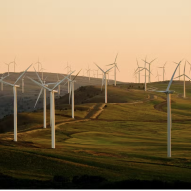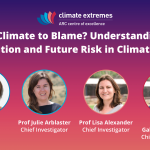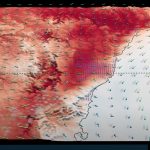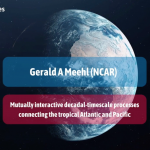 August 9, 2021 1:44 pm
Published by Climate Extremes
August 9, 2021 1:44 pm
Published by Climate Extremes
Nerilie Abram, Australian National University; Andrew King, The University of Melbourne; Andy Pitman, UNSW Sydney; Christian Jakob, Monash University; Julie Arblaster, Monash University; Lisa Alexander, UNSW Sydney; Sarah Perkins-Kirkpatrick, UNSW Sydney; Shayne McGregor, Monash University, and Steven Sherwood, UNSW Sydney The much-awaited new report from the Intergovernmental Panel on Climate Change (IPCC) is due later today. Ahead of the release, debate has erupted about the computer models at the very heart of global climate projections. Climate models are one of many tools scientists use to understand how the climate changed in the past and what it will... View Article
 July 29, 2021 10:32 am
Published by Climate Extremes
July 29, 2021 10:32 am
Published by Climate Extremes
Kim Reid offers a useful list of common unspoken knowledge for postgraduate students in the climate sciences. Hopefully, she says, this will save you some time and mistakes in the future.
 July 28, 2021 2:43 pm
Published by Climate Extremes
July 28, 2021 2:43 pm
Published by Climate Extremes
Irrespective of tipping points, climate change adaptation efforts will be less costly and disruptive to society – and will stand a better chance of success – if warming can be limited to 1.5°C rather than 2°C or higher. We therefore in no way advocate for policies that forgo pursuing the ambition to limit global warming to 1.5°C, regardless of whether that target remains feasible or not.
 July 2, 2021 1:49 pm
Published by Climate Extremes
July 2, 2021 1:49 pm
Published by Climate Extremes
Prof Julie Arblaster, Prof Lisa Alexander, and Assoc Prof Gab Abramowitz discuss the research around the Attribution and Risk research program. The episode explores why we can detect climate signals in some extreme weather events and not others and the implications this has for understanding how these events may change.
 June 23, 2021 10:41 am
Published by Climate Extremes
June 23, 2021 10:41 am
Published by Climate Extremes
Climate sensitivity describes how sensitive the Earth’s temperature is to a doubling of the amount of carbon dioxide in the atmosphere. One measure of climate sensitivity for projections of future climate is the Equilibrium Climate Sensitivity (ECS). ECS is the increase in the global average temperature between the pre-industrial era and a future doubled carbon dioxide climate once equilibrium of the climate has been reached.
 June 17, 2021 8:55 am
Published by Climate Extremes
June 17, 2021 8:55 am
Published by Climate Extremes
Navid Constantinou developed a new Julia package that provides solvers for geophysical fluid dynamics problems in periodic domains. It was also the first time he had been involved in an open peer-review process, and this experience was "mind changing".
 June 15, 2021 11:58 am
Published by Climate Extremes
June 15, 2021 11:58 am
Published by Climate Extremes
Research by Annette Hirsch into heatwaves over Sydney has been turned into a spectacular animation by Drew Whitehouse from NCI Vizlab.
 May 26, 2021 10:26 am
Published by Climate Extremes
May 26, 2021 10:26 am
Published by Climate Extremes
CLEX Director, Prof Andy Pitman has been elected as a Fellow of the Australian Academy of Science for his outstanding contribution to climate change.
 May 19, 2021 11:57 am
Published by Climate Extremes
May 19, 2021 11:57 am
Published by Climate Extremes
The Royal Society has called for an international next-generation climate modelling centre (pdf), based on new cutting-edge high-performance computing and data services to support efforts toward net-zero emissions and to enable effective climate adaptation.
 May 7, 2021 5:01 pm
Published by Climate Extremes
May 7, 2021 5:01 pm
Published by Climate Extremes
On Thursday, April 8, 2021, Gerald A Meehl (NCAR) presented a seminar, Mutually interactive decadal-timescale processes connecting the tropical Atlantic and Pacific.










